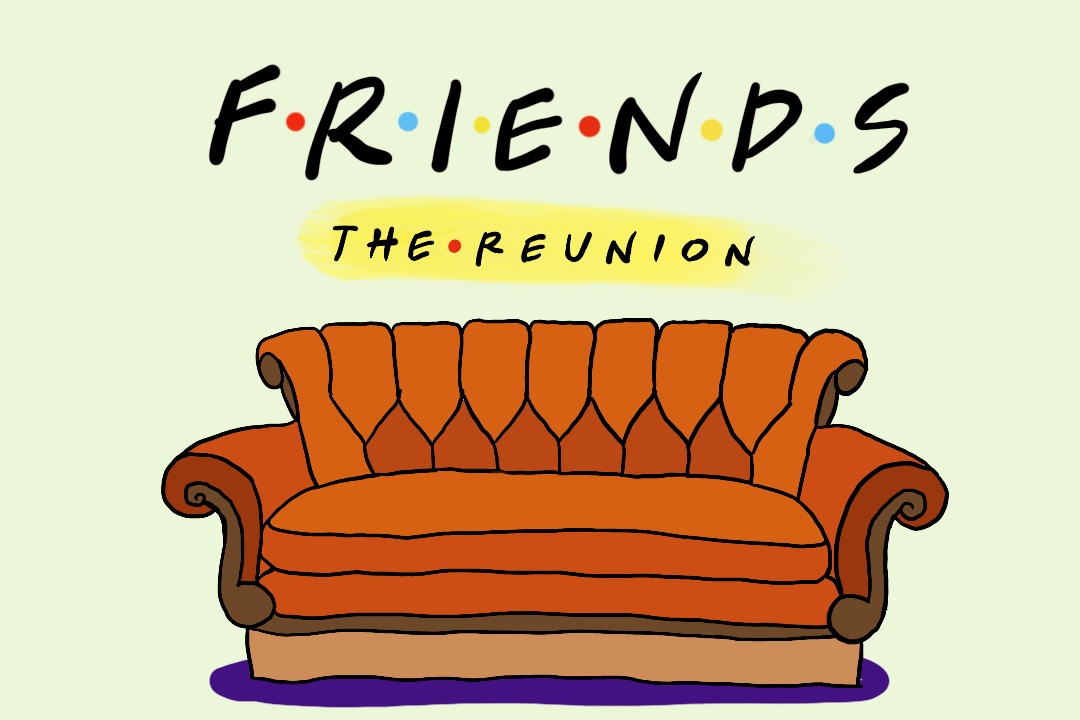Earlier this summer, a reunion episode of the popular 1990s television show Friends aired on HBO Max. The special, meant to celebrate the sitcom’s 25th anniversary, featured all six main members of its original cast: Jennifer Aniston, Courteney Cox, Lisa Kudrow, Matt LeBlanc, Matthew Perry, and David Schwimmer. It was also filmed on the show’s original sound stage in Burbank, California.
When I first heard about the reunion, I was worried that this episode would ruin the series by trying to capitalize on the show’s popularity. I knew deep down that it would be impossible to return to the same friendship and chemistry the cast brought to the screen after they had been apart for so long. Despite my skepticism, I was still excited to see the Friends cast on screen together again and to witness the surprises they’d bring.
Moving on to the content of the episode, titled “The One Where They Get Back Together”; rather than focusing on the magic of the main cast of Friends, it was riddled with random celebrities, like Lady Gaga, Justin Bieber, and even Nobel Peace Prize laureate Malala Yousafzai. Though their appearances were probably meant to attract younger audiences, I felt that their performances, catwalks, and insights on the show did nothing except increase the special’s running time. The producers were making drastic attempts to stay relevant rather than offering devoted fans some content that was significant to the original show, bringing nothing exciting to the table.
Speaking of ‘table,’ an awkward chunk of the reunion episode focused on table readings, in which the original cast of Friends read through scripts of iconic scenes, such as “The One Where Everybody Finds Out” and “The One With The Embryos.” However, rather than eliciting the sense of nostalgia I was expecting, the readings were nothing short of a cringe fest. The subtleties of the cast’s acting that I once fell in love with were replaced by inorganic attempts of reuniting their passion, such as when Jennifer Aniston and David Schwimmer read the scene leading up to their characters’ first kiss.
Because my disappointed reaction could’ve been swayed by my dedication to the original show, I decided to watch it with a friend. She was indifferent about the series; though she didn’t dislike any aspect of the original Friends, she didn’t think the show was as funny as it was hyped up to be.
As we watched the reunion, I regularly checked on this friend’s facial expressions to see if she was laughing when she was prompted to — she wasn’t. As I kept being disappointed by her reactions, it became clear to me that since she hadn’t watched Friends’ original run, she couldn’t relate to its reunion’s content in any way. Instead, she was just being fed something I dub “white people sitcom humour”; a stark reminder that the series has been previously criticized for featuring predominately white characters and storylines.
Despite all my complaints, I still see Friends as a formative element of my teenage years. When I finished the series for the first time, I immediately turned on its first episode to begin binge watching it again. Friends included a setting and plot that was completely out of my grasp to understand. Nevertheless, the series offered me a sentiment I yearned for: for my friends to be my family. This is why it so naturally resonated with viewers worldwide; Friends is simply a funny and straightforward show which, in my opinion, isn’t meant to be considered intellectually layered.
In today’s world, it’s easy to see that Friends has lost its sense of relevance. But that shouldn’t take away from the fond memories many viewers have of it. As someone who was introduced to Friends after its original run, I can only imagine the excitement its live audience felt before a taping, or how it felt to eagerly tune into an episode each week. They must have felt as if they were part of the characters’ journeys, and that they shaped the trajectory of the stories taking place onscreen. Watching each specific episode must remind them of the stage of life they were in when they first watched it.
I’m glad that Friends’ reunion episode didn’t attempt to continue its characters’ stories, but instead gave me a glimpse of the true friendships that existed behind the scenes. The cast and crew of the series did justice to their viewers by letting the series’ ending stay as is, and by allowing us all to imagine what ultimately happened to its characters. No matter what bittersweet feelings I hold towards its reunion, I’m glad that Friends has offered me a constant to get me through the next stage of my life.


